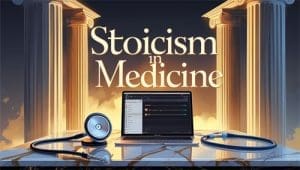Stoicism in Medicine

Overview
Medical professionals make complex ethical decisions daily that determine life and death outcomes. These pivotal moments demand emotional resilience paired with clear rational thinking. Ancient stoicism addresses these qualities remarkably well.
Stoicism’s deep-rooted principles and practical beliefs give healthcare providers a powerful framework to make ethical decisions. Rational thinking, emotional balance, and accepting uncontrollable circumstances form stoicism’s core principles. These elements prove especially relevant in modern medical practice.
Stoic principles can revolutionize healthcare delivery and boost doctor-patient relationships. Medical professionals will find practical solutions to their ethical challenges in this piece. Healthcare providers can apply stoic wisdom effectively in clinical settings while maintaining their professional excellence and personal well-being.
Our latest podcast on Stoicism
Please like and subscribe if you enjoyed this video 🙂 Our new
channel is ~ one-month old and subscribing helps ensure you never miss a
video.
Just click on the small globe that appears in the lower right corner.
Stoicism in Medicine Presentation
Understanding Stoic Principles in Modern Healthcare
Stoicism’s ancient philosophy provides a reliable framework that addresses modern healthcare challenges by emphasizing rational decision-making and emotional balance. Stoicism teaches its practitioners how to stay calm while pursuing virtue and helping others [1].
Core Stoic concepts relevant to medicine
Several key principles form the foundation of stoic philosophy in healthcare:
- Dichotomy of Control: Healthcare professionals must focus on what they can control and accept what they cannot [1]
- Rational Assessment: Practitioners should carefully evaluate before acting and avoid quick emotional decisions [2]
- Virtue-Based Practice: Helping patients while maintaining professional excellence remains the main goal [1]
These principles work well with medical practice because they emphasize decisions based on rational assessments rather than emotional reactions [3].
Alignment with medical ethics frameworks
Stoicism naturally fits with existing medical ethics frameworks through its focus on virtue and rational decision-making. Research shows that stoic training leads to better emotional wellbeing and self-efficacy in healthcare settings [4]. The philosophy creates a balanced approach to emotional involvement that helps practitioners keep their professional objectivity while showing appropriate empathy [5].
Benefits of Stoic practice in healthcare
Healthcare professionals who apply stoic principles see several important advantages in their practice. The philosophy helps practitioners stay composed during crises and make well-informed decisions [3]. Studies reveal that stoic-based psychological training positively affects both resilience and empathy in medical practice [4].
Modern healthcare leaders who welcome stoic principles know how to:
- Direct operational challenges with greater calmness
- Make decisions using rational assessments
- Communicate better with patients and colleagues [3]
Stoic practices help practitioners handle distressing emotions while keeping human connections [4]. This approach doesn’t support emotional suppression but promotes appropriate emotional responses that help both healthcare providers and patients [5].
Healthcare professionals can develop what researchers call “empathic bravery” through stoic principles – knowing how to connect meaningfully with patients while keeping professional boundaries [5]. This balanced approach lets practitioners provide compassionate care and protect their emotional well-being.
